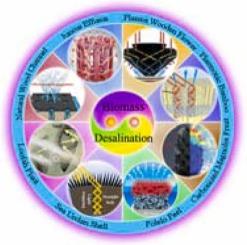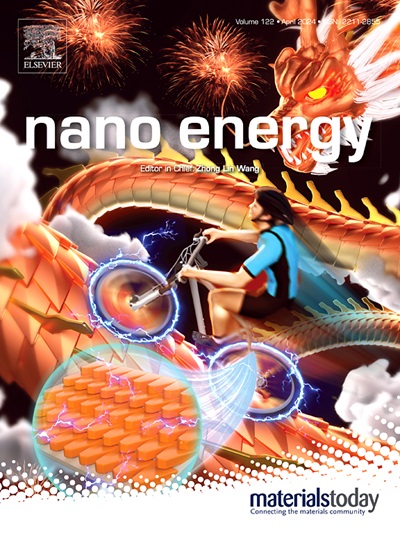Interfacial Solar Vapor Evaporator Based on Biologically Natural Composites
IF 16.8
1区 材料科学
Q1 CHEMISTRY, PHYSICAL
引用次数: 0
Abstract
Fresh water is one of the basic substances on which human society depends for survival and development. With the urgent need to achieve carbon neutrality, novel nanomaterials and environmentally friendly technologies have been explored and continue to drive the sustainable development of energy storage and conversion devices. Natural biomass materials have good photothermal conversion properties and can efficiently absorb sunlight and convert it into thermal energy for seawater evaporation and desalination. The use of natural biomass materials can significantly improve energy efficiency and reduce energy consumption compared to conventional solar desalination technologies. The cost of natural biomass materials is relatively low because they are widely available and renewable. In addition, biomass materials are relatively simple to extract, process and utilize, which reduces equipment maintenance and operating costs. Some natural biomass materials have good weather resistance and stability and can be operated for long periods of time without damage in harsh marine environments. This makes solar desalination systems using these materials more stable and reliable. Nevertheless, there are many problems in the practical application of these materials in desalination. In this paper, we will discuss the advantages and disadvantages of natural biomass materials in solar seawater desalination, and introduce the research progress in recent years with analysis of their practical applications. In the future, we can further research and develop natural biomass materials with higher efficiency and lower cost to meet the pressure of increasing global demand for fresh water while realizing environmental protection and sustainable development.

基于生物天然复合材料的界面太阳能蒸发器
淡水是人类社会赖以生存和发展的基本物质之一。随着实现碳中和的迫切需求,新型纳米材料和环境友好型技术不断被探索,并持续推动着能量存储和转换装置的可持续发展。天然生物质材料具有良好的光热转换特性,可高效吸收太阳光并将其转化为热能,用于海水蒸发和海水淡化。与传统的太阳能海水淡化技术相比,使用天然生物质材料可以显著提高能源效率,减少能源消耗。天然生物质材料的成本相对较低,因为它们可广泛获取且可再生。此外,生物质材料的提取、加工和利用相对简单,可降低设备维护和运行成本。一些天然生物质材料具有良好的耐候性和稳定性,可在恶劣的海洋环境中长期运行而不会损坏。这使得使用这些材料的太阳能海水淡化系统更加稳定可靠。然而,这些材料在海水淡化的实际应用中还存在许多问题。本文将讨论天然生物质材料在太阳能海水淡化中的优缺点,并结合实际应用分析介绍近年来的研究进展。未来,我们可以进一步研究和开发效率更高、成本更低的天然生物质材料,以满足全球日益增长的淡水需求压力,同时实现环境保护和可持续发展。
本文章由计算机程序翻译,如有差异,请以英文原文为准。
求助全文
约1分钟内获得全文
求助全文
来源期刊

Nano Energy
CHEMISTRY, PHYSICAL-NANOSCIENCE & NANOTECHNOLOGY
CiteScore
30.30
自引率
7.40%
发文量
1207
审稿时长
23 days
期刊介绍:
Nano Energy is a multidisciplinary, rapid-publication forum of original peer-reviewed contributions on the science and engineering of nanomaterials and nanodevices used in all forms of energy harvesting, conversion, storage, utilization and policy. Through its mixture of articles, reviews, communications, research news, and information on key developments, Nano Energy provides a comprehensive coverage of this exciting and dynamic field which joins nanoscience and nanotechnology with energy science. The journal is relevant to all those who are interested in nanomaterials solutions to the energy problem.
Nano Energy publishes original experimental and theoretical research on all aspects of energy-related research which utilizes nanomaterials and nanotechnology. Manuscripts of four types are considered: review articles which inform readers of the latest research and advances in energy science; rapid communications which feature exciting research breakthroughs in the field; full-length articles which report comprehensive research developments; and news and opinions which comment on topical issues or express views on the developments in related fields.
 求助内容:
求助内容: 应助结果提醒方式:
应助结果提醒方式:


